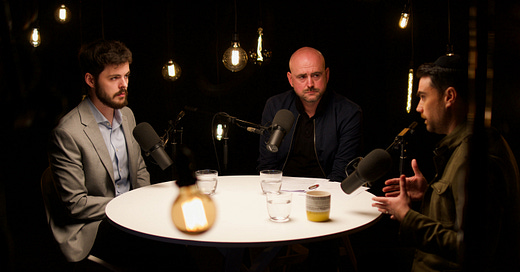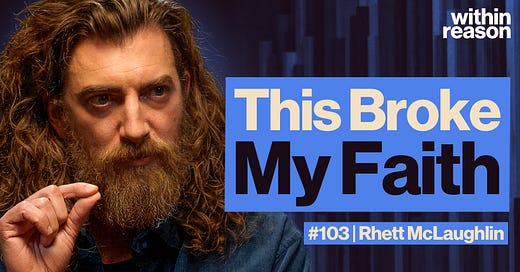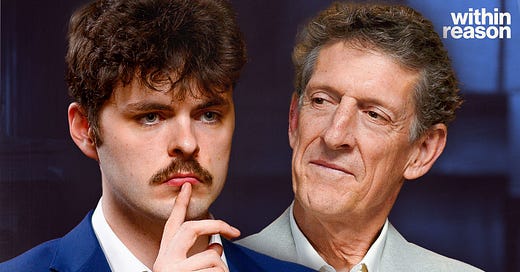
An old joke involves photographing two books together: “Everything They Teach You At Harvard Law School,” alongside “Everything They Don’t Teach You At Harvard Law School.” The absurd implication of the infinite wealth of knowledge that ought be contained in these 600 pages or so is an indictment of that thing which publishers love: a catchy title.
Shamefully, myself now being a publisher of sorts—on this crisp and youthful Substack (welcome, by the way…)—I have immediately succumbed to the temptation. And so, reader, I have not been quite honest with you. You will not find within this entry an exhaustive list of everything I should like to say to Ben Shapiro if given the chance, but rather an expansion on a single theme of our dialogue, and an important hand-selected point which I should have raised in my debate with him last year, managing only instead to put it to his ghost during the next shower I took.
No God? No Free Will.
Herein consists the principal motivation for this trivial contribution to the celebrated schools of (i) philosophy and (ii) Ben Shapiro criticism. At the outset of our cordial joust, Ben1 chose to raise the issue of free will, arguing that most people, including me, act in such a way as to indicate a belief in this mystifying philosophical paradox.
“Every day we get up, we believe—virtually all of us, whether we say we believe it or not—we actually act in ways that betray the idea that we believe that we have control over our own actions, at least to a certain extent, and that that control makes a difference in the world. And that’s what gives us purpose…” (5:35)
The belief in free will, he goes on to stipulate,
“[comes] from a language that is external to the Darwinian language of evolutionary biology. If you’re talking about free will there is nothing in nature that suggests the ability to make a decision free of environment and genetics in combination, in some sort.” (6:02)
My first thought was to celebrate a point of agreement between us. This led to, I think, some confusion. “Yes,” I parroted, “if there is no God there is no free will,” before adding a rather less-than-clear, “but I think that’s because of the truth of the latter of those statements.” (8:37)
A number of first responders seemed to think I was here granting Ben’s point, when really I was only granting one of its supporting concepts. Ben wanted to argue, it seemed, that free will is only possible if atheism is false, but he never quite makes it that far: his argument begins with a similar-sounding but distinct assertion that if atheism is true, free will is impossible. I expressed, and will reaffirm now, my complete agreement with this assessment. Without God, free will cannot exist. But this is because I do not believe free will can exist in any circumstances.
This is why I went on to provide an abridged version of my logical case against free will, which I think establishes not just that free will does not exist, but that it cannot exist. I will not bore you with it here, but I will commit it to paper (to screen?) soon.
So, it is comparable to Ben saying something like, “If atheism is true, then four-sided triangles do not exist”. This is of course true, but in a misleading way. Four-sided triangles do not exist anyway, and so they do not exist whether atheism is true or not.2 Those not listening carefully may think that by granting this statement, I have implied that four-sided triangles may exist if atheism is false. A forgivable fallacy, but a fallacy still.
When Ben says, “If atheism is true, there is no free will,” then, my agreement with him is a mundane one. Sure, Mr Shapiro, but you must now establish that atheism being false somehow provides for the possibility of free will’s existence. How else is this even relevant to a debate about God and religion?
When I tried to make this point, Ben responded:
“No, the actual claim that I originally made, if you recall, was a conditional claim. I did not claim “Free will exists, therefore God.” I claimed “If you believe free will exists, it cannot exist in a materialist universe.” (21:15)
So, Ben is not trying to prove God’s existence, nor the existence of free will, apparently. What exactly is he doing, then?
“I’m not saying that it does exist—maybe it doesn’t. […] Maybe you’re totally right and all of this is just a series of chemical firings—that’s quite plausible. That’s fine. What I have said, and this is the argument that hasn’t yet been rebutted, is that society does require an extraordinary number of people to believe that they are capable of making decisions, for the good or for the bad.” (21:48)
So, he’s just trying to say that belief in free will is necessary to societal stability?
I have only the following to say: Ben may recall a video he produced for the Daily Wire entitled “The Atheist Delusion”. This polemic against materialism, and my response to it, provided the tinder for organising our conversation. In it, as the description promisingly concludes, “Ben tells us why God is a necessary hypothesis”.
Necessary in what sense? One of the earliest supporting arguments he provides in the video is that “we live as though we believe in choice. As though we are capable of making decisions in some way based on our own will. What in materialism would allow for such choice?” Familiar territory. He follows this with, “God is necessary for these thoughts. Or at least the possibility of God. Trash God altogether, and you can’t explain why you would believe in […] even your own ability to choose.”
Perhaps my comprehension skills are not what they once were, or perhaps Ben really is trying to tell us that we should believe in the existence of God. It is possible that he really is just saying that, “without God, we can’t believe in free will, and that upsets society,” but this would be a strange argument to make if Ben does not in fact believe in free will.
Why? Because his video is called “The Atheist Delusion”. And if Ben meant what he said in our debate, that it’s “quite plausible” that free will doesn’t exist, but that we nonetheless need to believe in it for social reasons, then (as I asked him at the time) who is relying on the delusion here?
It is a strange thing indeed for Ben to say that atheism is a delusion because it can’t account for free will, only then to say that maybe free will is a delusion that we need to believe in. This latter admission does two things: first, it undercuts the idea entirely that atheism is indeed a delusion (since it may be free will that is the delusion), and second, it undercuts the whole wrongness of holding delusory beliefs in the first place, which his entire attack on atheism as a delusion must rely upon.
Ben’s retort? “I think that you are delusional there’s no free will and you think I’m delusional in the sense that there is no free will and yet I believe in it.” (24:06)
Once again, then, seeming to fall back on a firm conviction that free will does exist.
When pressed on the logical argument against free will, Ben says, “Well, I’m not saying it does exist, just that we should believe in it for societal reasons.” And when I then point out this would make it delusory, he responds, “Well, I think it does exist, and you’re delusional to think it doesn’t.”
To be honest, I’m not even clear on where the goalposts were to begin with.
***
If I am right (which of course I may well not be), then free will is something akin to a four-sided triangle. It doesn’t make sense even as a concept. And although with God all things are possible, a four-sided triangle is simply not a thing, and neither is free will.
“Shapiro”? It feels too formal. Almost cold. And in a way that saying “Peterson” or “Hitchens” does not. I will use “Ben”, and refuse to even attempt to rationalise my considered inconsistency. Dawkins will always be Dawkins, for example. And often “Professor”, but rarely “Dr.”. This is has nothing to do with respect or grammar; it is purely aesthetic. This Substack does not—and will not—abide by any style guide.
I am not necessarily claiming that free will is as impossible as a four-sided triangle, or impossible in the same way; I am only making use of an analogy. Then again, if something is truly impossible under any circumstances, it is difficult to see how something else could be more or less impossible. So perhaps they are on level footing.












There is a nuance that I think is important to discussions about free will, and this applies to Shapiro just as well as Saplosky: are we talking about fundamental free will (as per the fundamental rules of reality), or effective free will (something that's good enough in every practical sense).
I agree with Alex that there is no fundamental free will, in that regardless of whether you believe in a deterministic reality or a probabilistic one, there is simply a contradiction in terms between free (indicating something undetermined, unconstrained) and will (implying a level of control from the agent). If it's free, it's not will, and if it's will, it's not free. This would kinda require the agent to be external to nature to be both unconstrained and willful, and that's where we could plug God in to fill the gap.
But then Shapiro replies with "society does require an extraordinary number of people to believe that they are capable of making decisions". That's fine, there is really no contradiction here. We are able to make decisions. Those decisions are not free in the most metaphysical sense, but why would we want them to be? We are making decisions precisely to respond to the world around us.
It also doesn't matter that those decisions are determined by the world around us, and even that I am determined by the world around me, because that simply is what we are. All those determined causal chains still produce human beings that are conscious and (often) intelligent, and there simply is no alternative ideal ME that could exist independently of that. So inasfar as it makes sense at all to call myself a person, that person is one that is able to make decisions. In other words, the statements "I exist" and "I can choose" require the exact same assumptions. We do have effective free will.
The reason Ben thinks talking about "a series of chemical firings" is a good counterargument is that, I suspect, he has little scientific culture. One of the core ideas of physics is that complexity can emerge from simplicity through scale. A lot of simple chemical reactions can amount to something really complex and not reducible to the details of those reactions. Those two levels of description don't mesh.
By the way, I also think Saplosky is wrong when he says that since there is no fundamental free will, there cannot be any notion of responsibility. At the level of the fundamental, there isn't even a WE that could be responsible for anything. Choice, and responsibility, are notions that only exist at the level of an individual, so inasfar as the word responsibility even makes sense, we may have it. What we do with it is another matter entirely.
I think it’s worth mentioning that inserting God as a solution to the problem of free will is not as adequate as it’s being made out to be. Take for instance the verse in which Jesus predicts that Peter will betray him 3 times before the rooster crows. Jesus is said to be God, meaning he cannot be wrong. How exactly does Peter have free will? If he chooses to not betray Jesus that would make Jesus wrong and thus not omniscient. If Peter does betray Jesus that would mean his decision was already made up before he even realized what the decision was, thus relinquishing his free will. The theist may make the move of open theism but this brings along its own issues as well.